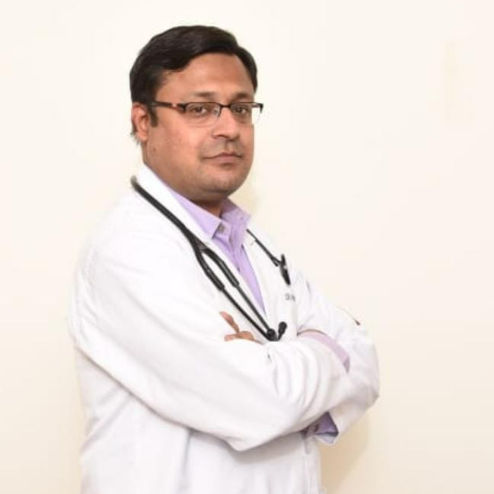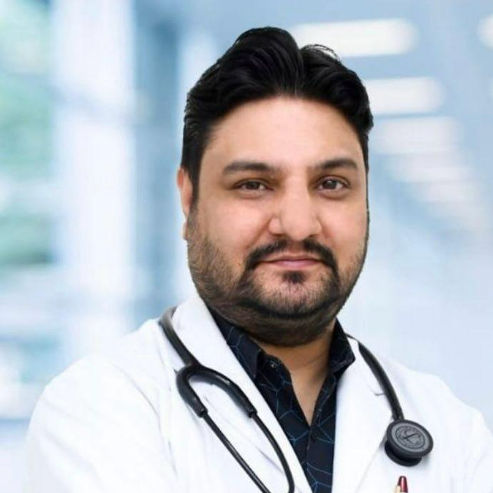Diarrhoea: Causes, Symptoms, and Effective Treatment Strategies
Learn about the causes of diarrhoea, common symptoms, and effective treatments to manage and prevent dehydration and other complications.

Written by
Last updated on 13th Jan, 2026
Diarrhoea is a digestive disorder characterised by the frequent passage of loose or watery stools. It is usually caused by infections, dietary habits, or underlying health conditions. If left untreated, diarrhoea can lead to abdominal pain, extreme dehydration, and depletion of nutrients, which can be life-threatening. Children, the elderly, and people with immunity issues are more likely to fall prey to the infection, requiring rapid and precautionary intervention.
Common Causes of Diarrhoea
From viruses and bacteria to chronic health conditions, diarrhoea has many potential causes. Below are some of the most common ones –
Viruses: Rotavirus and Norovirus are leading causes.
Bacteria: Contaminated food and water could be a source of bacteria such as Escherichia coli (E.coli) or Salmonella.
Parasites: These are protozoa such as Giardia lamblia and Entamoeba histolytica, which occur in endemic areas with bad sanitation.
Things like dietary habits and intolerances can also be a reason behind this condition:
Lactose or gluten intolerance (as in coeliac disease) can cause diarrhoea.
Spicy or oily foods can irritate the lining of the gastrointestinal tract.
In some cases, a few chronic conditions can also contribute to the development of this condition. These are –
Inflammatory bowel diseases like Crohn’s disease and ulcerative colitis
Celiac disease
Endocrine disorders like hyperthyroidism
Sucrose intolerance
Small intestinal bacterial overgrowth (SIBO)
Chronic pancreatitis
Symptoms and Types
Diarrhoea occurs in both acute and chronic forms, each with different signs and significances:
Acute Diarrhoea: Acute diarrhoea lasts for a short duration (1 to 2 days). It is characterised by watery stools, abdominal cramps, nausea, and occasional fever. It is caused by infections or poor eating habits.
Chronic Diarrhoea: Chronic diarrhoea lasts four weeks or more and indicates other underlying health problems. Symptoms include repeated loose stools, weight loss and fatigue, and malabsorption problems such as bloating or loss of essential nutrients.
Dehydration: Dehydration occurs when the body loses more fluids than it intakes. It causes dry mouth, nominal to no urine, and patients feel dizzy and lethargic. Severe dehydration can result in disrupted electrolyte balance, organ dysfunction, and death, particularly in children and the elderly.
Diagnosis of Diarrhoea
A detailed discussion of the patient's medical condition and symptoms helps in the preliminary diagnosis of diarrhoea. The process involves inquiring about the duration, frequency, and quality of stools and pertinent information such as recent travel, food consumption, or exposure to infectious agents.
Laboratory investigation and imaging tests are sometimes needed to diagnose diarrhoea. These diagnostic methods could be:
Stool Culture: To check for bacterial or viral infections
Ova and Parasite Exam: This is done to detect parasitic infections.
Blood Tests: To look for signs of dehydration, electrolyte imbalances, or signs of infection.
Imaging Tests: Lab tests such as abdominal X-rays or ultrasound are used to check for changes in the shape of the digestive system.
Get Your Appendix Checked
Treatment Options
Treatment for diarrhoea usually focuses on relieving symptoms, treating the underlying condition, and preventing complications. The following methods used are:
Dietary Changes and Fluid Management: Modifying the diet to eliminate irritants and maintaining adequate hydration is a significant element of treating diarrhoea. Usually, light and non-spicy and oil foods are administered to combat this digestive disorder. This includes soups, steamed vegetables, etc. Also, increasing the intake of a liquid that includes coconut water, oral rehydration solutions (ORS), etc., is important to replace lost fluids and electrolytes.
Medication: Diarrhoea is also treated with anti-diarrheal medications like loperamide, which can reduce stool frequency and relieve symptoms. Antibiotics may also be prescribed to treat bacterial infections if this is the underlying cause, but antibiotics are not usually effective in cases of viral diarrhoea.
Rehydration Therapy: Oral rehydration therapy (ORT) is the first treatment of choice in mild to moderate dehydration. In more severe cases, intravenous fluids may be needed to quickly replace lost fluids and electrolytes, especially in infants, young children, and the elderly.
Complications of Untreated Diarrhoea
Diarrhoea can be very serious if the patient is not treated, especially with regard to dehydration and malnutrition.
Dehydration: The loss of fluids and electrolytes (salts and sugars) can lead to weakness, confusion, and organ failure. Hence, the prevention of dehydration with immediate rehydration through oral rehydration solutions (ORS) and more fluid intake is imperative. In more serious situations, intravenous fluids will be necessary to restore balance.
Nutritional Deficiencies and Malnutrition: Long-term diarrhoea could also cause the malabsorption of nutrients, which may result in malnutrition or a lack of vitamins or minerals. This can be dangerous for children and vulnerable adults because it can negatively impact growth, immune function, and general health. However, early treatment and dietary modifications can prevent many of these adverse outcomes.
Preventive Measures
Individuals can follow a few methods to prevent diarrhoea, emphasising hygiene, sanitation, and food safety.
1. Maintaining Hygiene and Sanitation
In terms of hygiene and sanitation, one can focus on –
Use soap and water to wash hands after using the toilet and before eating.
Ensure access to clean drinking water.
Dispose of waste properly.
Frequently clean kitchen and bathroom surfaces.
Raise awareness about hygiene practices in the communities.
2. Food Safety Practices
In terms of food safety, one should –
Always be sure to wash fruits and vegetables before eating them.
Heat food adequately to destroy dangerous organisms.
Keep food at the right temperature so bacteria don't grow.
Stay away from unclean and unverified food items.
Special Considerations
Diarrhoea leads to various health issues, the most potent one being dehydration, which impacts children and infants particularly more than anyone else. So, it's essential to watch for signs of dehydration, including a dry mouth and lethargy and focus on administering oral rehydration solutions (ORS) meant for children. Also, avoid giving anti-diarrheal medications to young children unless directed to do so by a health care provider and seek medical help in case of prolonged diarrhoea, fever or blood in stools.
Travel-related diarrhoea is one of the most common health issues, especially for those visiting regions with poor access to clean water and sanitation. To manage and prevent it:
Do not drink unfiltered water or consume food from dubious sources.
Carrying water bottles and ensuring food is well prepared, cooked and stored.
Bring anti-diarrheal drugs and oral rehydration salts (ORS).
Maintain good hand hygiene, such as frequent handwashing, especially when travelling to areas with inadequate sanitation.
When to Seek Medical Attention?
Diarrhoea can often be treated at home with proper hydration and changes in diet. However, it should be consulted with a doctor when it becomes serious and one exhibits symptoms of dehydration, such as dry mouth, less urination, and dizziness, especially in at-risk individuals like children, the elderly, or those with impaired immune systems.
Also, if someone is experiencing diarrhoea for longer than two days (adults) or 24 hours (children), they should see a healthcare professional. Additional warning symptoms are recurrent fever over 38°C (101°F), intense stomach pain or cramping, blood within the stools, or black, tarry stools.
Conclusion
Diarrhoea is a common yet potentially serious condition that requires prompt attention to prevent dehydration and complications. By maintaining proper hygiene, consuming safe food, and seeking timely medical care, individuals can effectively manage and prevent diarrhoea and ensure their well-being.
Consult Top Gastroenterologists
Consult Top Gastroenterologists

Dr Bhargav Vuppumalla
General Physician/ Internal Medicine Specialist
5 Years • MBBS MD GENERAL MEDICINE
Bengaluru
Apollo Medical Center, Marathahalli, Bengaluru

Dr Harish K C
Gastroenterology/gi Medicine Specialist
15 Years • MBBS MD DM MRCP(UK) (SCE-Gastroenterology and Hepatology)
Bengaluru
Apollo Clinic, JP nagar, Bengaluru

Dr. Shivaraj Afzalpurkar
Gastroenterology/gi Medicine Specialist
13 Years • MBBS, MD General medicine (Gold medalist), DrNB (Gastroenterology), MNAMS
Bengaluru
Apollo Clinic, JP nagar, Bengaluru

Dr Rohit Sureka
Gastroenterology/gi Medicine Specialist
15 Years • MBBS, DNB General Medicine, DNB Gastroenterology
Jaipur
Apollo 247 virtual - Rajasthan, Jaipur

Dr. Amit Pandita
Gastroenterology/gi Medicine Specialist
10 Years • MBBS. MD (INTERNAL MEDICINE) DrNB (GASTROENTEROLOGY AND HEPATOLOGY)
Delhi
Apollo Hospitals Indraprastha, Delhi

